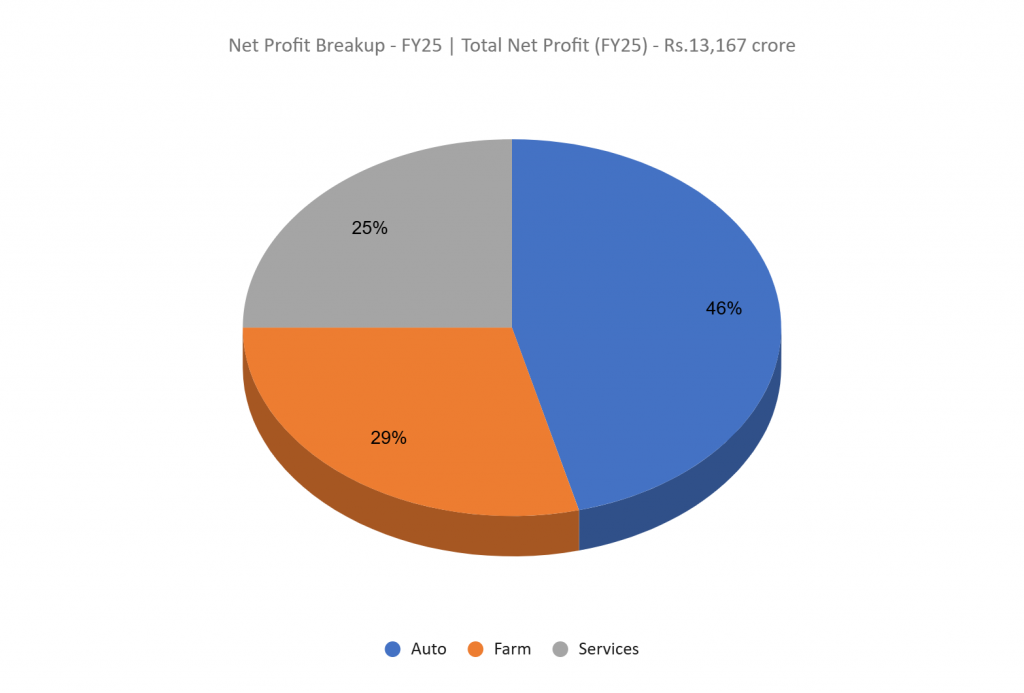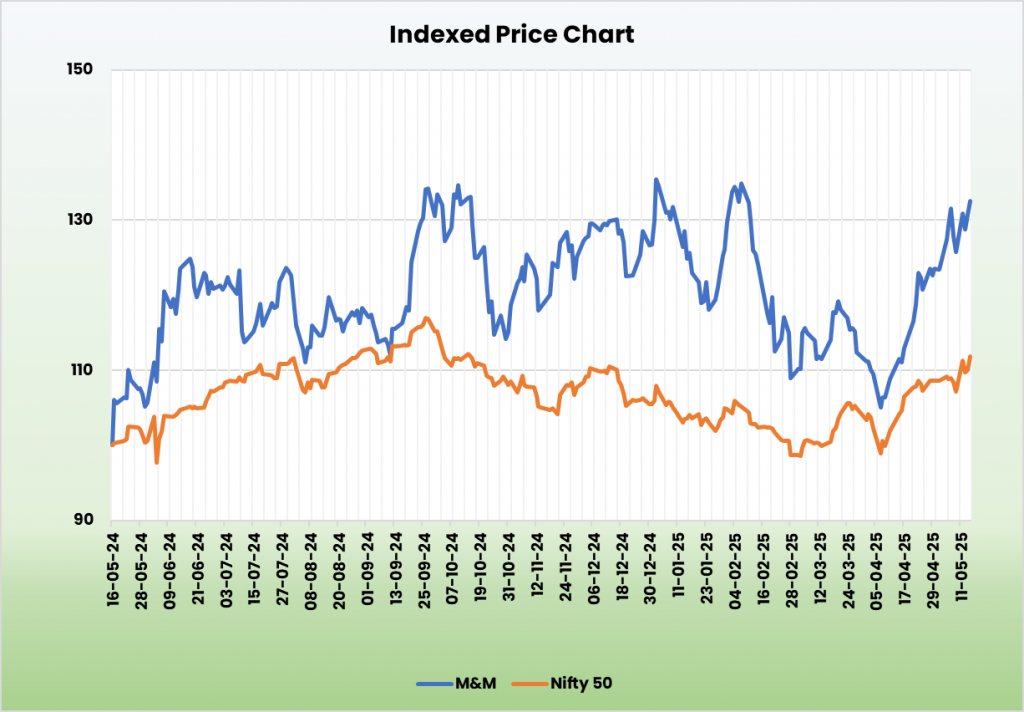
Mahindra & Mahindra Ltd – Bold by Design
Mahindra & Mahindra Ltd, the flagship entity of the Mahindra Group, primarily focuses on mobility products and agricultural solutions. Over time, it has expanded into a variety of service sectors, including financial services, hospitality, IT, renewable energy, and residential and commercial real estate. Founded in 1945 and headquartered in Mumbai, the company is the world’s largest tractor manufacturer by volume. It also holds the top position in India for SUV revenue market share, electric three-wheeler sales, and 3.5-ton light commercial vehicles. The company continues to be a market leader in pick-up segment for over 24 years. Mahindra operates in over 100 countries, with a global network of 47 manufacturing facilities and 21 research and development centres. Additionally, through Tech Mahindra Ltd and Mahindra & Mahindra Financial Services Ltd, it is also a major player in the IT and finance services industry.

Products and Services
The company has its business spread across 3 main segments:
- Auto – SUVs and LCVs, 3-wheeler, motorcycles and, trucks and buses.
- Farm – Tractors and agri services and farm machinery.
- Services – Financial, hospitality, logistics, renewable energy, technology, real estate, auto components, auto recycling, pre-owned cars, aerospace and defence.

Subsidiaries – As of FY24, the company has 139 subsidiaries and 11 associates/joint ventures.

Investment Rationale
- Growth strategies – The company has recently inaugurated a state-of-the-art EV manufacturing and battery assembly facility at Chakan, with plans to add a new production capacity of 1,20,000 units per annum at the site. Looking ahead, it also intends to set up a new greenfield plant post-FY28 to support future growth. To strengthen its presence in the trucks and commercial vehicles segment, the company has acquired approximately 59% stake in SML Isuzu. Additionally, it has entered into a strategic partnership with Anduril Industries to co-develop and co-produce advanced defense technologies, including autonomous maritime systems, AI-driven counter-unmanned aerial systems (CUAS), and next-generation command and control (C2) software. The company has also undertaken several acquisitions to expand its renewable energy portfolio.
- Launches – In FY25, the company unveiled its flagship electric SUVs – the XEV 9e and BE 6e – and is establishing a dedicated manufacturing facility with an annual capacity of 90,000 units, supported by a capital investment of Rs.4,500 crore. According to management, these models are expected to redefine performance standards within the industry. Bookings are already underway, with deliveries slated for the first half of FY26. The company also plans to introduce internal combustion (IC) engine SUVs during FY26. In the Light Commercial Vehicle (LCV) segment, the launch of the Veero has reinforced its foothold in targeted niche markets. Additionally, the company introduced three new tractor models and broadened its three-wheeler lineup with four new offerings.
- Q4FY25 – The company generated revenue of Rs.42,599 crore, which is an increase of 20% compared to Q4FY24. EBITDA grew by 20% YoY to Rs.7,911 crore. The company reported net profit of Rs.3,295 crore which is an increase of 20% compared to the corresponding quarter of the previous year. During the quarter, the company has 43% market share in the Farm segment.
- FY25 – The company generated revenue of Rs.1,59,211 crore, an increase of 14% compared to FY24 revenue. Operating profit is at Rs.30,518 crore, up by 23% YoY. The company posted net profit of Rs.13,167 crore, a jump of 20% YoY. The company generated Rs.10,000 crore cash during FY25.
- Financial Performance – The company has generated a revenue and net profit CAGR of 21% and 27% over the period of 3 years (FY22-25). Average 3-year ROE & ROCE is around 18% and 13% for FY22-25 period.


Industry
The Indian automobile industry has long served as a reliable barometer of the country’s economic health, given its significant contribution to both overall economic growth and technological progress. Currently, the sector is experiencing strong momentum, fuelled by substantial foreign investments, rising export volumes, and a growing focus on sustainability. India holds the distinction of being the world’s largest producer of tractors. In 2021, the Indian passenger car market was valued at US$ 32.70 billion and is projected to grow to US$ 54.84 billion by 2027, with a compound annual growth rate (CAGR) of over 9% from 2022 to 2027. The country is also positioning itself to become the world’s largest electric vehicle (EV) market by 2030, with an estimated investment potential exceeding US$ 200 billion. As part of this transition, the Indian government aims for 30% of all new vehicle sales by 2030 to be electric.
Growth Drivers
- The allowance of 100% FDI (Foreign Direct Investment) under automatic route in India’s automotive sector with the sector having received a cumulative equity FDI inflow of about Rs. 3,22,015 crore (US$ 36.21 billion) between April 2000 – September 2024.
- Various initiatives by the GoI such as Production Linked Incentive (PLI), Automotive Mission Plan 2026, scrappage policy, etc.
- Growing demand for farm mechanization, emergence of newer technologies in the farming sector and continued Government’s focus on improving the state of agriculture in India.
Peer Analysis
Competitors: Maruti Suzuki India Ltd & Tata Motors Ltd.
The company is experiencing steady revenue growth and delivering stable returns on invested capital. Relative to its peers, it appears fairly valued and offers significant potential for earnings and margin improvement.

Outlook
New product launches have helped the company secure a strong market share both domestically and internationally. Its recent acquisitions are expected to unlock operational synergies, bolster product development capabilities, and broaden market reach. The company has earmarked Rs.16,000 crore for investments during FY22–27. It has also increased monthly SUV production capacity by 25%. Between 2027 and 2029, the company plans to produce 200,000 electric vehicles from its Born Electric (BE) range. Additionally, it is committed to investing Rs.1,000 crore in its Last Mile Mobility (LMM) segment.

Valuation
We believe the company will be able to maintain its growth momentum, supported by a robust launch pipeline and increasing operational leverage. We recommend a BUY rating in the stock with the target price (TP) of Rs.3,747, 27x FY27E EPS.
SWOT Analysis

Disclaimer: Investments in the securities market are subject to market risks, read all related documents carefully before investing. Securities quoted here are exemplary, not recommendatory. Please consult your financial advisor before investing. Please note that we do not guarantee any assured returns for the securities quoted here.
Research disclaimer: Investment in the securities market is subject to market risks. Read all the related documents carefully before investing. Registration granted by SEBI, and certification from NISM in no way guarantee the performance of the intermediary or provide any assurance of returns to investors.
For more details, please read the disclaimer.








